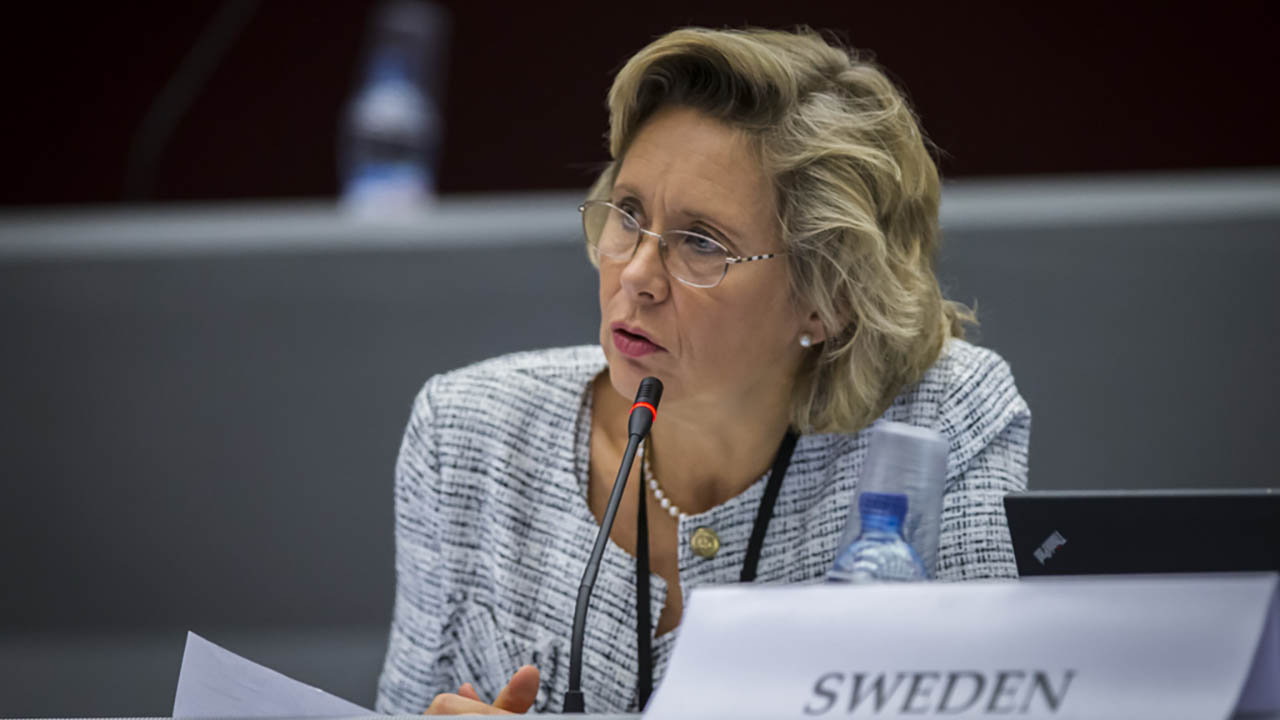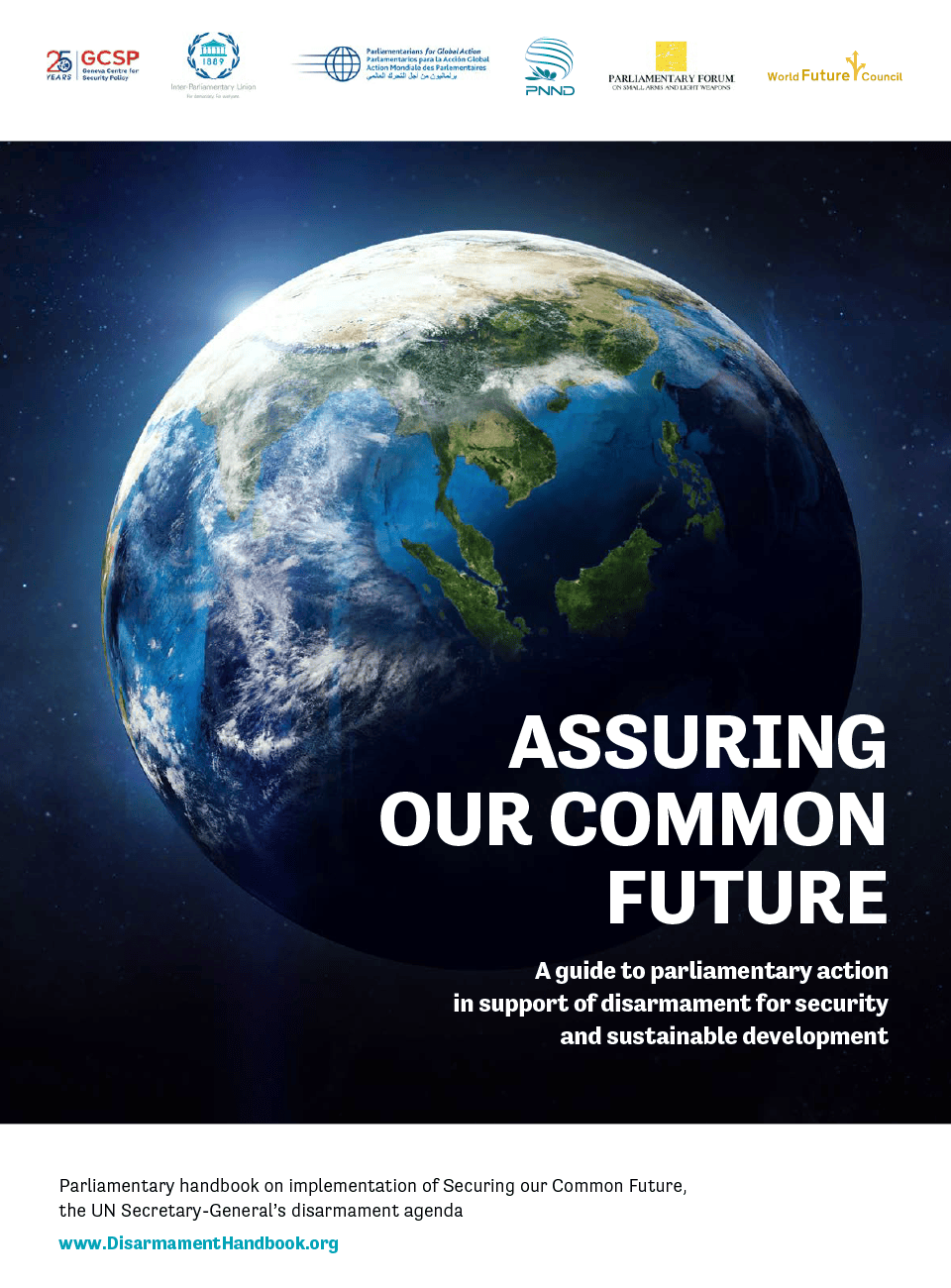
Remarks to the Swedish Parliament at the Launch of Parliamentary Handbook on Disarmament for Security and Sustainable Development
Fellow Parliamentarians - Your Excellencies, Ladies and Gentlemen
I am delighted to participate in the Swedish Parliament Launch of this timely, important and very comprehensive Parliamentary Handbook on disarmament for security and sustainable development.
Not only is it an invaluable reference source, but this Handbook also identifies numerous different ways in which Parliamentarians, both as advocates and lawmakers, can make genuine contributions in the wider disarmament arena.
Conventional arms, as well as Weapons of Mass Destruction, continue to pose a clear and present danger in our world today.
The usage and threat of usage of these arms and weapons has devastated the existence of humanity for centuries.
They have also had a disastrous impact on our collective sustainable development which continues to this day.
The greater sophistication and autonomy of these weapons in recent years has only compounded an already grave problem.
In recognition of this inescapable reality, and within PGA, and since its founding 43 years ago, we have placed disarmament and non-proliferation at the very heart and core of our objectives and goals.
As a parliamentary organization made up of deeply committed Parliamentarians in over 130 countries worldwide, we take some pride in the many, concrete accomplishments in addressing both conventional and WMD objectives.
In the mid 1980s, PGA Membership spearheaded the 6 Nation, 5 Continent Initiative in connection with a Partial Nuclear Test ban, for which the organization won the inaugural Indira Ghandi Peace Prize.
This important global initiative, in turn, helped pave the way for the adoption of the Comprehensive Nuclear Test Ban Treaty.
In the early 1990s the PGA Secretariat and Members participated in some of the drafting sessions of the Chemical Weapons Convention and also promoted its universality in its early days of life: PGA conducted a significant treaty-ratification campaign that contributed to the entry into force of the treaty that gave life to the Organization for the Prohibition of Chemical Weapons (OPCW), based in The Hague.
In more recent times, PGA Members have played decisive, often central, catalytic roles, contributing substantively to the ratification of the Arms Trade Treaty (ATT) by 51 of the 110 States Parties to date, after having proposed to, and petitioned with, the UN Secretary-General and UN Member States in support of the drafting, negotiation and adoption of the ATT that would have sent a strong message that conventional weapons shall not be exported to regimes that are committing gross abuses of human rights and International Humanitarian Law. As the Office of the Human Rights Commissioner for Human Rights stated in 2014: “The UN Arms Trade Treaty is the first legally-binding multilateral agreement that prohibits states from exporting conventional weapons to countries when they know those weapons will be used for genocide, crimes against humanity or war crimes." PGA continues to fully endorse the anti-atrocities clause contained in the ATT and calls for all Member States to respect it and enforce it, starting with any arms’ sale that can continue to fuel the perpetration of atrocities in Yemen.
In parallel, our PGA Members in several regions worldwide continue to actively promote Implementation of the UN Program of Action Addressing the Illicit Trade in Small Arms, the International Tracing Instrument and compliance with respective reporting requirements. PGA’s continued work on addressing the multiple threats posed by conventional weapons is done in coordination and pa partnership with the UN Office of Desarmament Affairs (UNODA).
In tandem, and cogniscent of its continued, indeed growing importance, PGA launched its Global Parliamentary Campaign to Support Universality and Implementation of the Biological Weapons Convention in 2015. In the past 5 years, PGA Members successfully took up the challenge, in some cases almost single-handedly, of persuading their respective Governments in 5 UN Member States worldwide to ratify or accede to this Convention, never more important than it is today. It is very significant for PGA that our Members are having an impact in countries deeply affected by bloody armed conflicts, such as in the Central African Republic, which ratified the BWC two years thanks to the leadership initiative of our colleague Dep. Beatrice Epaye: In Central African Republic, it is essential for peace-making and stabilization to ensure that rebel groups do not have any access to biological weapons or other weapons of mass destruction.
In this respect, PGA Members worldwide have become increasingly involved in seeking the prevention of proliferation of all Weapons of Mass Destruction to Non State Actors, including terrorist organizations.
In the past 3 years alone, PGA Members in Central Africa, Guinea Bissau and the Solomon Islands were actively engaged in successively persuading their respective Governments to submit mandatory First National Reports on implementation of UN Security Council Resolution 1540 to the UN Security Council 1540 Committee. On account of our good work in this field, PGA has been invited to be part of the informal consultations of the UN Security Council concerning the review of Resolution 1540.
Most recently, PGA has launched another donor-supported Campaign to Promote Nuclear and Radiological Security, with our global membership advocating for greater universality and implementation of the International Convention for the Suppression of Acts of Nuclear Terrorism, the Convention on Physical Protection of Nuclear Material as well as its Amendment.
As we celebrate just over 20 years since the adoption of UN Security Council Resolution 1325 (2000) on Women, Peace and Security, it is gratifying that, within PGA, many of our most active, and effective, Members in promoting disarmament objectives, both in relation to conventional weapons and Weapons of Mass Destruction, are female Members of Parliament.
While we recognize that we still have a long way to go in promoting greater engagement by female Parliamentarians, we at least are fortunate to have a foundation in place which strengthens our ongoing efforts to promote implementation of UNSCR 1325 more fully than has been the case to date.
More broadly still, it may be usefully recalled, that the right to life encapsulates one of, if not the, most fundamental human rights that we enjoy, as humanity.
If our efforts to promote disarmament cannot properly safeguard this, our most precious human right – the right to life – then all other human rights which we so assertively seek to uphold necessarily fall by the wayside and become irrelevant.
For without life, there is nothing.It is the human right from which all other human rights flow.
We would all do well to remind ourselves more frequently of this inescapable fact.
This Parliamentary Handbook on Disarmament will greatly facilitate our collective efforts to promote basic, core human rights and the more enduring, sustainable development that comes with it.
The Covid 19 pandemic through which we are all trying to survive today is not only a timely reminder that a pathogen causing a deadly disease can also be weaponized, but, furthermore, serves to highlight once again just how fragile and vulnerable humanity is and the many, serious threats we must all confront together, and effectively address.
Be assured that we in PGA will continue to do our part.
Thank you.


